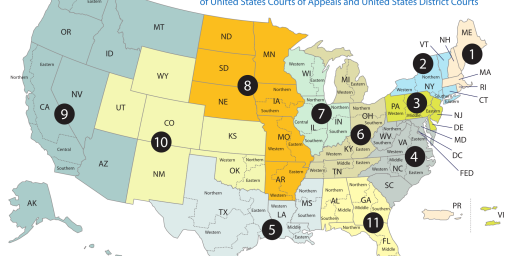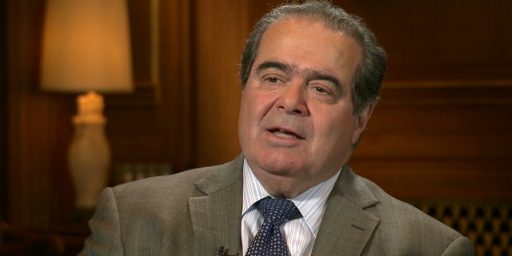PLEDGE CASE
NYT reports SCOTUS is adding the infamous 9th Circuit decision to their docket:
The Supreme Court added the Pledge of Allegiance to the docket for its new term on Tuesday, agreeing to consider whether public schools violate the Constitution by requiring teachers to lead their classes in pledging allegiance to the flag of “one Nation under God.”
The justices, who begin their daily session with heads bowed as the marshal intones “God save the United States and this honorable court,” accepted a case that like the affirmative-action and gay-rights cases of the last term places the court at the center of a heated public controversy.
The case is an appeal by a California school district of a decision that has been the subject of an intense national debate since the United States Court of Appeals for the Ninth Circuit, in San Francisco, issued it 16 months ago.
The Federal District Court in Sacramento initially dismissed a lawsuit brought by an atheist, Michael A. Newdow, who said he did not want his daughter exposed daily in her elementary school classroom to “a ritual proclaiming that there is a God.” The Ninth Circuit overturned that decision, first ruling in June 2002 that the words “under God,” added by federal statute in 1954, made the pledge itself unconstitutional.
In an amended opinion issued earlier this year, the court narrowed its ruling by confining it to the public school context, invalidating school policies that require teachers to lead willing students in the pledge. Ever since a Supreme Court decision on behalf of Jehovah’s Witnesses in 1943, public schools may not compel students to recite the pledge. The Supreme Court indicated today that it would address only the recitation of the pledge in public schools, not its constitutionality as a general matter.
The Supreme Court’s action today had several unusual elements that could have an impact on the eventual outcome. One was the decision by Justice Antonin Scalia not to participate in the case, an evident if unacknowledged response to a “suggestion for recusal of Justice Scalia” that Mr. Newdow sent to the court last month.
Quite interesting, especially the Scalia recusal. Surely, he’s no more predisposed on such a case than, say, Thurgood Marshall was on dozens of civil rights case he voted on?
And, while I resent the imposition of religious nonsense into state functions, this one strikes me as sufficiently innocuous–of the nature of getting a day off for Christmas–as to be a mere part of our social culture and not religious per se.





I’ll only speak to the Scalia recusal. The reason for it is that he’s been making stump speeches at political rallies, declaring how he’d rule on this specific case before hearing oral argument, or probably even reading the transcript of argument from the 9th Circuit. (http://www.sltrib.com/2003/Jan/01132003/nation_w/19722.asp)
If you comment on a specific case, like “there’s no way we’re going to overturn the sentence of that child-killing son-of-a-bitch”, one can safely assume that you’ve lost your objectivity.
The fact that Thurgood Marshall would be inclined to uphold civil rights legislation is a completely false analogy.
Nor,
But Scalia isn’t a juror; he’s a Justice. Justices almost always have the case decided before oral arguments by the nature of their ideological backgrounds. Marshall wasn’t simply a liberal and a black man, he had previously been the chief attorney for the NAACP. Yet he didn’t recuse himself in cases brought by/argued by the NAACP. Nor should he have.
I think the main word in your post is “SUCH a case”. Scalia express opinions in THE case before it had been appealed. In any event, the main paragraph in the story you cited was:
“It is extremely unusual, however, for a recusal to be sought or granted on the basis of a public statement of opinion on the legal issue before the court. Justice Scalia’s remarks were consistent with his often-stated views and were surprising only in their specific reference to the case, which had not yet been appealed to the Supreme Court”
Nor,
True. And I could see that argument in a criminal case where an individual’s right to a “fair trial” is at stake. But this is a very broad public policy issue that will be decided only once. My guess is that the very question–is the reference to God in the Pledge constitutional–never occured to Scalia before the 9th Circuit controversy. But his public statements don’t alter the fact that he thought the argument assinine immediately, they merely make the fact known.